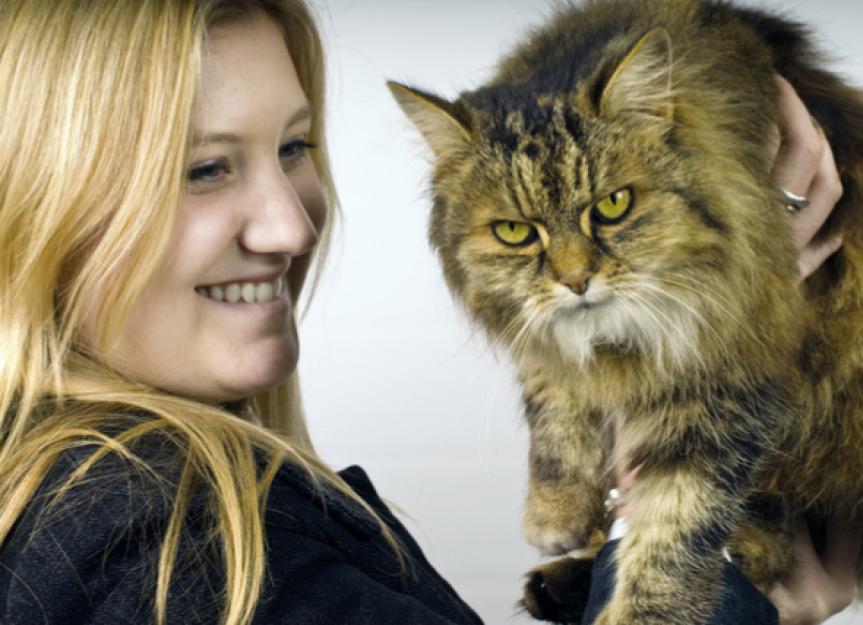Did you know that just like humans, cats can also suffer from anxiety? As a dedicated pet owner, it’s crucial to recognize and manage your cat’s anxiety to foster a loving and trusting relationship. Understanding what contributes to your cat’s stress can make all the difference.
There are numerous factors that can trigger anxiety in cats, yet thankfully, a variety of calming products are available that pet owners can explore to help ease their feline friends’ distress.

What Causes Cat Anxiety?
Cat anxiety is a complex issue with multiple potential triggers. According to certified cat behavior consultant Marilyn Krieger, who operates in Northern California, even small changes can profoundly affect a cat’s emotional state. “A shift in routine can be particularly unsettling for cats,” she emphasizes. “New surroundings or unfamiliar animals can generate significant stress, and even minor disturbances like a home renovation or a loud voice can induce anxiety in sensitive cats.”
Similarly, Mikel Delgado, co-founder of Feline Minds and a certified cat behavior consultant, explains that anxiety is a more persistent state than fear. “There’s a clear distinction between a cat that gets frightened during fireworks on the Fourth of July and one that lives in a state of constant stress, reacting to what might seem like trivial situations,” she notes.
If your cat does experience anxiety, it can manifest in various ways, from hiding and loss of appetite to inappropriate urination and defecation. “Conversely, a relaxed cat will comfortably eat, drink, and rest in plain sight, engage with their owners, and play with toys instead of constantly avoiding interaction,” Delgado clarifies.
Keeping Cat Anxiety at Bay
Identifying your cat’s anxiety is the first step towards managing it, and there are multiple strategies you can try. However, finding the right solution may require some experimentation. Both Delgado and Krieger emphasize individual differences among cats, so what works for one may not work for another.
Understanding your cat’s behavioral cues can provide insight into their anxiety levels.
Delgado points out that many calming products are available over the counter and may not provide miraculous results. “Most of these items won’t yield dramatic changes, but some can offer a mild calming effect,” she adds.
Thundershirts for Cats
One popular option is the Thundershirt® for cats, a specially designed compression vest that provides gentle, consistent pressure similar to swaddling a baby. While scientific research on its effectiveness with cats is sparse, Delgado states that anecdotal evidence suggests they can help reduce restlessness: “I’ve heard many stories of cats calming down and lounging comfortably while wearing a Thundershirt,” she affirms.
However, she cautions that the challenge often lies in putting the Thundershirt on your cat. “It’s essential to know how much handling your cat tolerates and their willingness to wear any type of garment,” she advises, adding that safety should always be a priority.
Cat Calming Collars
Cat calming collars, such as the Sentry HC collar, are another widely-used product that releases pheromones designed to mimic those from mother cats, calming both kittens and adult cats alike. Delgado mentions that while these collars can be effective for some cats, they have little effect on others. Introducing the collar gradually—and allowing your cat to get familiar with it—can help minimize stress during application.
Cat Calming Pheromone Diffusers
If your cat is averse to wearing anything, consider pheromone diffusers such as the Feliway® plug-in. These devices work by releasing synthetic versions of feline facial pheromones, which can help alleviate general anxiety. Feliway MultiCat diffusers are particularly designed for multi-cat households, promoting a peaceful environment. Krieger strongly advocates for diffusers over collars, pointing out that cats have the option to leave the room if they feel uncomfortable, thus reducing stress while still providing potential benefits.
Calming Cat Food and Treats
Another avenue worth exploring is specialized anti-anxiety diets or calming cat treats. Products like Royal Canin® Veterinary Diet Calm dry food and Vetriscience® Composure cat chews are formulated with ingredients like tryptophan, known for its relaxing properties. Delgado notes, “There’s evidence suggesting that these products can provide a mild calming effect under specific circumstances, especially during vet visits.” Calming diets can also help address gastrointestinal upset and other physical issues tied to anxiety.
Training and Playtime
Engaging in positive interactions, such as playtime or training sessions, can significantly aid in alleviating anxiety. “Positive experiences help bolster a cat’s sense of security,” explains Krieger. Discovering what types of play your cat enjoys—whether it’s puzzle toys or feather wands—can be pivotal in establishing a comforting routine.
When Should You Call Your Vet?
While over-the-counter options are helpful for many cats, some may require professional intervention. Delgado warns that if your cat is displaying signs of severe anxiety, such as excessive grooming, self-injury, or litter box accidents, it’s essential to consult with a veterinarian. The vet can prescribe medications tailored for anxiety management and suggest effective strategies to restore peace in your home.
For pet owners worried about their cat’s anxiety, understanding and responding to their needs can significantly improve the well-being of both the pet and the owner.
Image Credit: GettyImages/Pekic






